

These African countries have the fastest growing rich people. Mozambique is set to become the fastest growing African market for high-net-worth individuals (HNWIs).
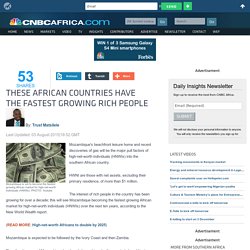
PHOTO: Youtube Mozambique's beachfront leisure home and recent discoveries of gas will be the major pull factors of high-net-worth individuals (HNWIs) into the southern African country. HWNI are those with net assets, excluding their primary residence, of more than $1 million. Les « expats » en Afrique, une espèce en voie de disparition. En Afrique, les lignes du recrutement bougent.
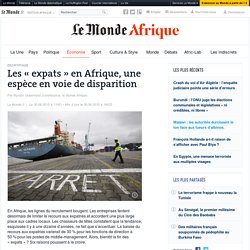
Les entreprises tentent désormais de limiter le recours aux expatriés et accordent une plus large place aux cadres locaux. Les chasseurs de têtes constatent que la tendance, esquissée il y a une dizaine d’années, ne fait que s’accentuer. La baisse du recours aux expatriés varierait de 30 % pour les fonctions de direction à 50 % pour les postes de middle-management. 7 things you might already know about Africa’s middle class, but are worth repeating. RECENTLY Nestle, the world’s biggest food company, cut 15% of its workforce in sub-Saharan Africa.
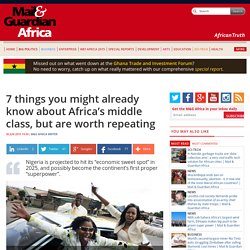
Cornel Krummenacher, its chief in the region, lit up quite a debate when he said, “We thought this would be the next Asia, but we have realised the middle class here in the region is extremely small and it is not really growing.” It was the wake up call the sometimes euphoric view about the emergence of Africa’s middle class, that has been enthusiastically held up as a phenomenon of the region’s changing economic fortunes, needed. So what do we know, and what don’t we about the African middle class? What is the substance, and what is the hype? For starters, their spending habits, especially on consumables and luxuries, attracts a lot of attention and for good reason; they are – rightly so - unlike any other period in the continent’s history. Multinationals in such discretionary spaces report more enthusiasm for their products, and consequently new trends.
Coca Cola’s Kalumbu. Africa Leads Mobile Money Boom as Service Providers Benefit from $2bn Revenue Opportunity - Juniper Research. Revenues from Mobile Money Transfers to Reach in Excess of $4bn in 3 Years Hampshire, UK – 23rd June 2015: New data from Juniper Research has revealed how Service Providers are benefiting from the boom in mobile money transfer services – with $2bn in revenues forecast for this year and $4bn annually 2018.
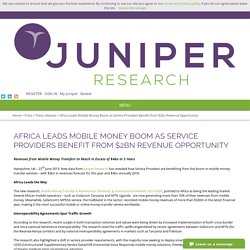
Africa Leads the Way The new research, Mobile Money Transfer & Remittance: Domestic & International Markets 2015-2020, pointed to Africa as being the leading market. Several African mobile operators – such as Vodacom Tanzania and MTN Uganda - are now generating more than 10% of their revenues from mobile money. Meanwhile, Safaricom’s MPESA service, the trailblazer in the sector, recorded mobile money revenues of more than $330m in the latest financial year, making it the most successful mobile or online money transfer service worldwide. Interoperability Agreements Spur Traffic Growth. 2014-facts-&-figures-regional-integration-uniting-to-compete. Explicit cookie consent. 10 secteurs d'activité qui fabriquent des milliardaires en Afrique. Sur les 1826 milliardaires du classement Forbes 2015, 29 sont africains.
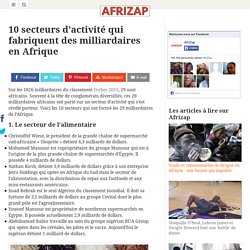
Souvent à la tête de conglomérats diversifiés, ces 29 milliardaires africains ont parié sur un secteur d’activité qui s’est révélé porteur. Voici les 10 secteurs qui ont formé les 29 milliardaires de l’Afrique. 1. Le secteur de l’alimentaire Christoffel Wiese, le président de la grande chaîne de supermarché sud-africaine « Shoprite » détient 6,3 milliards de dollars.Mohamed Mansour est copropriétaire du groupe Mansour qui est à l’origine de la plus grande chaîne de supermarchés d’Égypte.
Blue economy: why women must ride the wave of Africa’s maritime sector. The African continent has a two-pronged weapon in its race to industrialise and make use of its natural resources, according to Nkosazana Dlamini-Zuma, chairwoman of the 54-member African Union (AU): women and oceans.
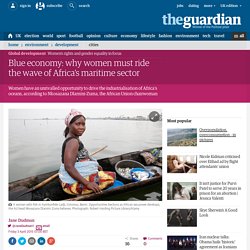
In March, while the former South African home affairs minister was attending a conference in Ethiopia on getting more women into parliament, the AU was hosting the first event specifically for women in Africa’s maritime sector in the Angolan capital, Luanda. The agenda covered how women can best make inroads into areas including shipping and maritime transport, fishing, offshore mining and other aspects of the “blue economy”. For Dlamini-Zuma, the two themes are intertwined. She believes that developing African sea power presents an unrivalled opportunity for women. “Now we’re trying to get everybody to focus on this and we are also saying to women that this is an underdeveloped area. China is taking a leading role in this process. Jeremy Rifkin : "L'Afrique peut être le leader de la 3e révolution industrielle"
L'économiste américain Jeremy Rifkin promeut la notion de 'société de coût marginal zéro'. © Africa CEO Forum/Youtube Selon l'économiste américain Jeremy Rifkin, l'Afrique est le continent le plus propice à l'essor de la troisième révolution industrielle et d'une société du coût marginal zéro, ses deux théories phares, qu'il présente en réponse au changement climatique.
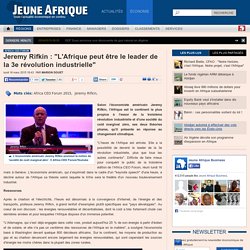
"L'heure de l'Afrique est arrivée. Made in Africa. Elaine Porteous looks at the procurement challenges facing Africa’s manufacturing sectors and highlights some notable successes.
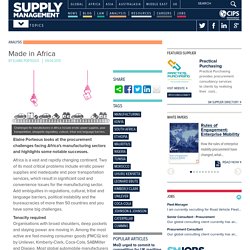
Africa is a vast and rapidly changing continent. L'Afrique sera la prochaine usine du monde et voici ce qu'elle produira - Agroalimentaire. Répondre aux besoins de base sur les marchés régionaux, et construire des partenariats stratégiques autour de l’innovation technologique, voici deux opportunités d’investissement industriel en Afrique identifiées par la Coordination pour l’Afrique de demain (Cade) dans un rapport intitulé « Bâtir des industries modernes et compétitives en Afrique » à paraître aujourd'hui, que L’Usine Nouvelle a pu consulter en exclusivité.
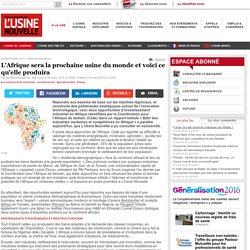
Il existe deux approches de l’Afrique. Celle qui regrette sa difficulté à valoriser les matières énergétiques, minérales, agricoles – qu’elle tire de son sol, et celle qui célèbre sa capacité à devenir l’atelier du monde. Poorest people open more bank accounts, World Bank study. Nearly three quarters of a billion people opened bank accounts or used mobile money providers for the first time from 2011 to 2014, a major leap forward in access to financial services that development experts say is key to ending global poverty.
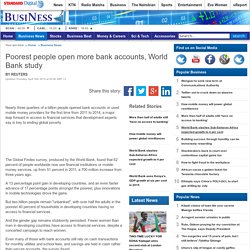
The Global Findex survey, produced by the World Bank, found that 62 percent of people worldwide now use financial institutions or mobile money services, up from 51 percent in 2011, a 700 million increase from three years ago. A 13 percentage point gain in developing countries, and an even faster advance of 17 percentage points amongst the poorest, plus innovations in mobile technologies drove the gains. But two billion people remain "unbanked", with over half the adults in the poorest 40 percent of households in developing countries having no access to financial services. And the gender gap remains stubbornly persistent. Fewer women than men in developing countries have access to financial services, despite a concerted campaign to reach women. Private sector joins push to raise African incomes through trade.
Innovative efforts to dismantle trade barriers in East Africa provide a shining example of how the private sector can work alongside governments and nonprofits to help drive sustainable economic growth and lift people out of poverty. The East African Community has made great steps toward stimulating trade in the region in recent years. Customs union and a common market mean that Burundi, Kenya, Rwanda, Tanzania and Uganda enjoy some of the most liberal trade relations on the continent.
Understanding West Africa’s Infrastructure Potential - Government, Public Sector - Nigeria. West Africa is increasingly identified as an attractive destination for investors across all economic sectors. Dépenses militaires : 4,6% de hausse en 2014. Le rapport a positionné l’Afrique comme le continent qui a connu la plus forte progression des dépenses militaires dans le monde au cours de l’année 2014.
En chiffres, cela a donné environ 50,2 milliards de dollars américains, soit une hausse de près de 6% par rapport à 2013. Sur une période plus longue, c’est-à-dire entre 2005 et 2014, l’Afrique a augmenté ses dépenses en armement de 91%. Africa’s information revolution: rhetoric and reality - Geographical. Africa's Urban Population Grows Younger, Fueling Economic Growth. Many sub-Saharan African countries are experiencing an economic boom thanks to vast natural resources.
But the region has another untapped asset that will help its growth outpace counterparts around the world -- its young people. The demographics of the world’s biggest cities are shifting toward younger people. And according to a new report from Ernst & Young, African hubs will have an advantage, as its cities become dominated by younger people while other major hubs watch their populations age.
Opportunités d'affaires en Afrique : Ces « villes champignons » qui émergent. Bien que la Banque Mondiale(1) ait récemment annoncé que la croissance économique de l’Afrique subsaharienne devrait ralentir en 2015, la classe moyenne de cette région compte toujours parmi celles connaissant la plus forte croissance au monde. De ce fait, le continent offre de nombreuses opportunités aux petites et moyennes entreprises (PME) et aux entrepreneurs africains tournés vers l’avenir.
Selon Charles Brewer, directeur général de DHL Express Afrique subsaharienne (ASS), le secteur de l’agriculture offre de nombreuses perspectives. Ce secteur est le principal secteur économique africain. Il représente 15 % du PIB total du continent et plus de 100 milliards de dollars US par an(2). « D’après les estimations, plus de 60 % des terres disponibles du globe se trouvent en ASS(3), ce qui suggère que le secteur a encore un potentiel de croissance incroyable. » Le secteur bancaire est lui aussi en plein essor.
African Milling School officially opens. 3/30/2015 - by World Grain Staff NAIROBI, KENYA — The African Milling School (AMS) celebrated its official opening on March 6. Around 150 guests attended. Why Africans must make the best of the digital age - The leaders turning Africa into the bright continent - Business Analysis & Features - Business - The Independent. Africa's Rising GDP Numbers. Home > Ideas > Commentary Make a Comment By Laurance Allen | March 23, 2015 "Nigeria becomes Africa's biggest economy," proclaimed the BBC in April 2014.
By "rebasing" its gross domestic product (GDP), Nigeria was able to show that its economy is even bigger than South Africa's. Here's an example of Nigeria's transformation. Young, rich and African: the Cheetah Generation. Young, rich and defying the odds in Africa Africa's 'Cheetah generation' are young, business savvy change-makers defying the continentâs stereotypes of hunger and conflict. Entrepreneurship is flourishing and there are new millionaires minted every day.
Videographer: Edwina Pickles. As rags to riches stories go, Dennis Makori's is a doozy. He didn't flick a light switch until he was 13 or touch a computer keyboard until his early 20s. Carte interactive : voyagez en Afrique sans visa ! Seul les Seychelles ne demandent aucun visa à l'entrée de leur territoire.© Glez/J.A. En vertu d'accords bilatéraux ou dans le cadre d'organisations sous-régionales, plusieurs pays africains ont supprimé l'obligation de visa d'entrée sur leurs territoires. Grâce à une carte interactive, "Jeune Afrique" vous propose de faire le point sur les États qui vous dispensent de cette procédure contraignante, en fonction de votre nationalité.
"Un passager n'ayant aucun papier d'identité [du pays] – passeport ou carte d'identité -, qu'il soit noir, parle une langue nationale ou encore qu'il soit cousin avec un bagagiste de l'aéroport est un passager étranger et à ce titre, il doit être muni d'un visa". Cette formule surprenante est reprise sur les sites internet de plusieurs aéroports au sud du Sahara. Il s'agit d'un rappel générique à la loi sur les documents officiels à posséder pour séjourner dans un pays étranger. Exposed: The Africans named, and some shamed, in the HSBC Swiss Leaks. Here are the real crooks in Africa—where big, legal businesses outdo organised crime. Ten reasons why 2015 is a crucial year for Africa - The Point Newspaper, Banjul, The Gambia.
Country Brand Ranking [2013 Data] by Country.